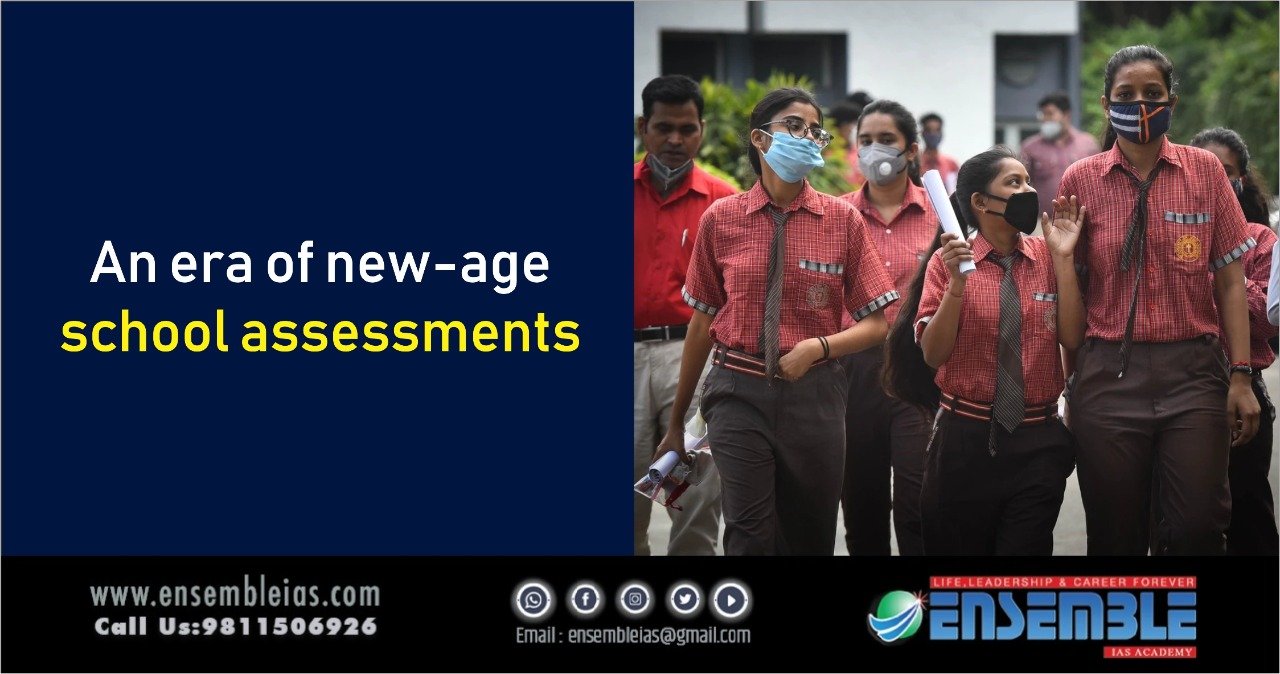An era of new-age school assessments
An era of new-age school assessments: The need to put an alternative mechanism of assessment in place, robust enough to yield results both in normal times as well as in times of exigencies, is essential
To buy our online courses: Click Here
The government’s decision to cancel the class 12 board examinations, conducted by the Central Board of Secondary Education (CBSE), in the backdrop of the devastating impact of the pandemic and public outrage, comes as a relief for thousands of anxious students and their parents.
The issue now is about the parameters on which students will be assessed and marked this year. Equally important is the methodology that would be used to ensure objectivity in assessment. There is an old saying — one can, albeit with difficulty, defy the effects of bad teaching, but escaping the impact of bad assessment is onerous indeed.
In the immediate context, boards can think of different permutations and combinations, prioritising student interests. It can, for example, set up panels to grade each student, and, after eliminating marks given at both the lower and higher ends, come out with an average score. To do so, it can rely on historical data of the students’ performances, particularly of their best year.
Additionally, marks obtained in the class 10 boards, and in the internal assessments and practical examinations in class 12 may be looked into. Fortunately, most CBSE schools have conducted practical examinations and have uploaded the results. And in cases where all practicals may not have been conducted, it may well liberally extrapolate marks from subjects for which examinations may have been conducted. Not much would be gained by assessing performances in classes 9 and 11 as students in these grades tend to be more focused on honing their co-curricular skills and social networks. For objectivity, fairness and transparency, the results of a particular school may be required to be vetted by a partner school.
Irrespective of any decisions that CBSE may come up with, there will be dissenting voices. However, this being a unique year all stakeholders will need to deal with the outcome with patience, trust and understanding. Universities, boards and schools need to come together in the best interest of the students.
That said, given the fact that institutions of teaching and learning — both schools and colleges — will have to undergo cyclic phases of closure and opening, they may have to adhere to hybrid learning. Working out a renewed assessment and evaluation system that, in being objective, is also simultaneously flexible, to cater to hybridity, is most pertinent in the long-run.
Attempts should be made to integrate regular in-house examinations with additional parameters of assessment such as communication abilities, critical thinking, creativity, ability to use knowledge for problem-solving, as well as collaborative social and citizen skills. The key idea behind such an evaluation is to understand the level of a student’s achievement of the objectives of the subject. While, in the early stages, these objectives could be set by teachers, students could be allowed to have some say, as they move on to higher classes. Evaluators can then correlate objectives to student performance. Multiple methods of assessments need to be used so that each child is assessed at her own level and potential, to help develop self-esteem and confidence.
The board exams will have to be flexible in their approach, dissuading rote learning. This learner development can only take place if assessment is sequential and continuous with application to real life, through case studies, open book testing, multiple choice questions, research and project-based learning.
Interestingly, the National Education Policy or NEP (2020) has provisions on regular formative assessments, designed to test conceptual clarity, analytical abilities and competence in terms of critical thinking. It also stresses on assessments, defining and identifying learning outcomes throughout the year through formative evaluation. Additionally, the provisions for stage-based assessments in classes 3, 5 and 8, in addition to board examinations in classes 10 and 12, and the idea of a national assessment centre, Parakh, to set benchmarks in standards are novel indeed.
This new-age assessment, as NEP describes it, aims to bring big shifts. But to be consistent both in approach and analysis, it necessitates multiple pedagogical approaches enabling differential learning. At the most fundamental level, however, it will be dependent on the extent to which the capacity of teachers is enhanced. Empowering them to develop internal assessment models that deal with competency-based learning, skills, attitudes and values, instead of standardised pen-paper testing systems is a must. An attempt has to be made to integrate periodic and continuous evaluation with unGooglable questions which focus on critical thinking, creativity, problem-solving and decision-making skills. Most importantly, schisms have to be laid at rest, mindsets will need change, training in pedagogy, technology and classroom transaction will have to be done on a war-footing failing which we will never be able to break the stranglehold of rote-based, pencil-paper-oriented colonial systems of learning.
Also Read: The importance of the PM’s ethanol push
Evaluating the performance of students is not just an external obligation, but is increasingly motivated by those who are involved in shaping it — faculty, staff, and institutional leadership. The need to put an alternative mechanism of assessment in place, robust enough to yield results both in normal times as well as in times of exigencies, is most imperative. Let us create an assessment system that is underlined by expertise and the ethics of trust.




